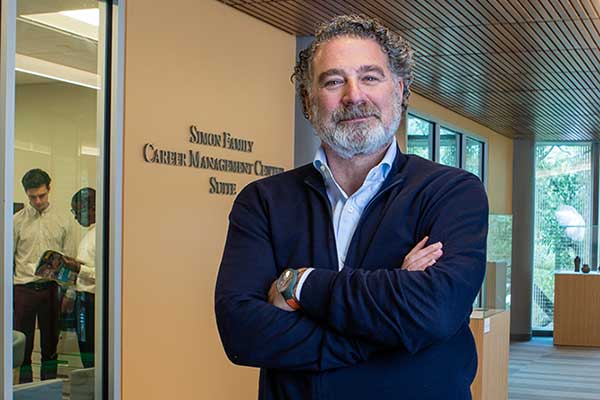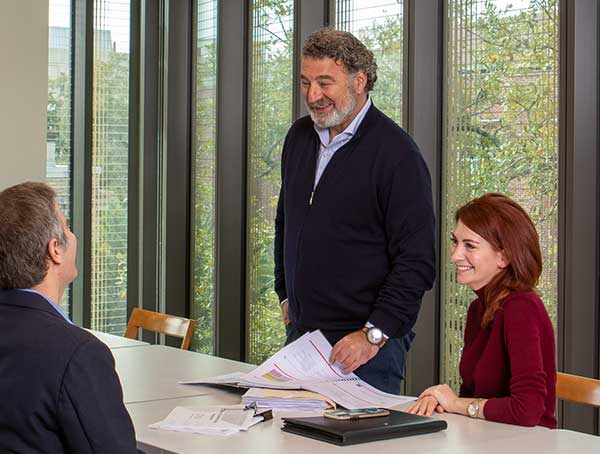
Irwin Simon, chair and CEO of Aphria Inc. and founder and former CEO of Hain Celestial Group, stands outside the Simon Family Career Management Center Suite, which was made possible through a gift of Simon and his wife, Daryl.
Irwin Simon was ready for something new.
For 25 years, Simon had worked to build Hain Celestial Group into one of the largest and most successful organic and natural foods companies in the world, with a wide-ranging portfolio of category leading brands including Celestial Seasonings, Terra Chips, Arrowhead Mills, Earth’s Best and Garden of Eatin’.
But in 2016, an accounting issue threatened to undermine everything he’d built. The issue forced the company to delay its fourth-quarter earnings report, sending its stock plummeting and unleashing a flurry of shareholder lawsuits. Simon successfully led Hain Celestial through an independent audit and Securities and Exchange Commission investigation. He ultimately brought the company back into compliance without the need for financial restatements, with no SEC penalties and had the law suits dismissed, but the yearlong ordeal did take its toll.
“I started Hain from scratch, before my kids were born, and I was a very hands-on CEO and chairman,” Simon says. “I did hundreds of earnings calls, had 39 manufacturing facilities, managed more than 12,000 people, and my products were in over 60 countries. I felt like I had accomplished more than I had imagined was possible, but a desire to build something new started to take root and I wanted to appease that feeling. So I said, ‘Okay. Act two.’”
SIMON’S FIRST ACT began more than 50 years ago in Glace Bay, a tiny community on the eastern edge of Cape Breton Island in Nova Scotia.
His father ran the local grocery store, and Simon worked there almost every afternoon, stocking shelves, sweeping floors and ringing up customers. The experience taught Simon the nuts and bolts of business and brands, but it also taught him something else: He wanted to be an entrepreneur.
“My father was very conservative in business,” Simon explains. “He was a very nice man and he treated people well, but he was not a risk taker. Working for him taught me that I wanted to take risks.”
Simon attended St. Mary’s University in Halifax, Nova Scotia, graduating with a degree in sociology. After briefly considering law school, he landed a sales and marketing job in Toronto with the Canadian licensee of Häagen-Dazs, the premium ice cream maker. Simon did well and was eventually offered a job in Häagen Dazs’ corporate office in New York. He jumped at the opportunity.
“It was one of the greatest jobs I ever had,” Simon says of the experience. “I learned the value of brand equity and selling quality products, but the big thing at Häagen-Dazs was building the brand. It was started in Bronx, New York, but the perception was that Häagen-Dazs was an international brand created in Sweden.”
Simon spent 10 years in New York with Häagen-Dazs, working alongside founder Reuben Mattus to grow the company into a $50 million global brand, but his desire for a more entrepreneurial career eventually led him to a smaller company: SlimFast, the weight loss products company.
“It was unbelievably entrepreneurial,” Simon says with a laugh. “There was no process. There was no strategy. It was, in essence, taking things, throwing them against the wall and seeing if they would stick.”
SlimFast taught Simon the importance of advertising, which helped the company grow into a $2 billion brand, but it also taught him about limits.
“Advertising alone cannot sustain growth,” Simon says. “You need quality products, a good strategy and the operational expertise to bring everything together.”
Simon clashed with SlimFast’s chairman, and in 1992 he was finally fired, which, as it turns out, was just what he wanted. He was ready to set out on his own.
“I didn’t want to get caught up in this corporate world again,” he says. “I knew I had entrepreneurial skills and I really didn’t like being put in a box, so I decided to start my own company.”
SlimFast had opened Simon’s eyes to the growing market for weight loss products, but its meal replacement shakes inevitably led to a cycle of “yo-yo” dieting. Consumers didn’t want fad diets, Simon realized. They wanted healthy food.
In 1992, Simon mortgaged his apartment and used his personal savings to purchase four small food businesses: a soy-based ice cream and meat company, a line of soy pizzas, a dietary foods company, and a frozen kosher foods manufacturer. He combined the businesses and took the new company public at a $2 million valuation. Simon’s mission was to take on the big food companies that were selling products with unhealthy ingredients and little nutritional value. Through his brands, he sought to spread awareness and cultivate a buzz around the importance of organic foods and clean eating.
“I wanted to change the way consumers ate,” he says.
In 1994, Simon upped the ante with the $22 million purchase of Hain Pure Foods Co., and he was off and running. Over the next decade, he continued to acquire new brands, typically selling equity or borrowing to finance the purchase, improving the brand and then growing sales by expanding into new markets.
Simon’s strategy worked. Hain Celestial grew into a widely diversified natural and organic products company with $3.5 billion in sales and a market cap of $7 billion at its at height. Its brands, which included Arrowhead Mills, Earth’s Best, Rudi’s, Celestial Seasonings, Rice Dream, Terra Chips, Sensible Portions and Garden of Eatin’ just to name a few, dominated the market and helped establish the better-for-you category.
“I was a risk taker and I always felt I had nothing to lose,” Simon says. “And, I’m proud to say, I think we really did change the way people eat.”

Irwin Simon, standing, meets with Erica Neely, the Freeman School’s assistant dean for strategic initiatives, in the CMC’s Recruiter Lounge, part of the Simon Family Career Management Center Suite.
SIMON FIRST BECAME ACQUAINTED with Tulane through his daughter Nicolette, the oldest of his four children. While many of her friends focused on schools on the east coast, she wanted to be in the south at Tulane and ended up graduating from the Freeman School in 2017 with a bachelor’s degree in marketing. Simon’s son Garett is currently a sophomore at the Freeman School.
After initially serving on the Parents Council, Simon joined the Board of Tulane in 2015. His involvement at Tulane as both a parent and an administrator and his experience on the boards of public companies and other private schools has made him a trusted adviser to Freeman School Dean Ira Solomon.
“I interact with Irwin regularly,” Solmon notes, “and I’ve benefitted greatly from his advice and counsel.”
A topic that Simon frequently discussed with Solomon was the need to combine outstanding academics with job opportunities.
“We need to ensure that kids who are paying this kind of money to attend college are going to get a great education, but also that they’re going to get a job when they finish,” Simon says. “How are we preparing them for their careers? How are we preparing them to interview and to network?”
In 2017, Simon and his wife, Daryl, made a significant donation to the Freeman School to fund the Career Management Center’s new facility in the Goldring/ Woldenberg Business Complex. The Simon Family Career Management Center Suite houses the Freeman School’s expanded Career Management Center, offering space for services including career coaching, resume assistance, interview preparation and salary negotiation consulting.
“Most students coming out of school don’t know what they want or what industry they want to be in,” Simon says. “How do they position themselves? How do they sell themselves? All those questions are very important, and that’s why the Career Management Center is so vital.”
Simon says he hopes his and Daryl’s gift will assist the CMC in helping students to prepare for interviews, providing students with job and internship opportunities, and making sure the biggest and most desirable companies continue to recruit from Tulane University.
Irwin Simon’s second act began in August 2018. Literally.
Just two months after notifying the Hain Celestial board of his decision to leave, Simon became executive chairman of Act II Global Acquisition Corp., a $300 million special purpose acquisition company (SPAC) focused on acquiring companies in the better-for-you consumer packaged goods sector as well as hospitality and restaurants. Simon also owns two Canadian sports teams: the Cape Breton Eagles, which competes in the Quebec Major Junior Hockey League, and the St. John Edge, which competes in the National Basketball League of Canada. He is presiding director at MDC Partners Inc., a provider of marketing and communication solutions and services, and he also served as a director of Barnes & Noble, one of the largest retail booksellers in the U.S.
All of which is to say Simon’s post-Hain plate was already full when, in December 2018, he got a call from a friend asking if he’d consider joining another board. The company was Aphria Inc., Canada’s third-largest producer of cannabis, which had come under fire following the release of a short-seller report. The company’s shares plunged 60% in the wake of the report, leading the board to seek an experienced outside executive to help steer the sinking ship.
Almost instantly, Simon was appointed chairman, where he was faced with guiding the company through the short-seller controversy, fending off a hostile takeover bid and solving an impending cash crunch. Simon embraced the challenge.
“I love going into the fire,” he says. “I love going in to fix things and then turning them around.”
In March 2019, following the resignation of Aphria’s CEO, Simon took on the additional title of interim CEO, which thrust him into an executive leadership role in the $150 billion cannabis industry. Simon didn’t disappoint. Less than six months later, Aphria made headlines for becoming the first cannabis company to turn a quarterly profit and raise $500 million. Simon was named CEO of Aphria in January 2020.
Cannabis is recreationally and medically legal in Canada, and the company recently obtained a German cultivation license, enabling it to enter what could be the largest medical cannabis market in Europe. Those opportunities excite Simon.
“My whole strategy is to turn Aphria into a packaged goods company,” says Simon. “Cannabis goes through different channels regarding how it’s sold, but I think what is really important is building the brand and establishing quality control, so consumers trust the products and don’t revert to the illicit market.”
While Simon never expected to be back doing earnings calls six months after stepping down from Hain, he’s having the time of his life.
“I love what I’m doing, I’ve got some really great people I work with, and I’m in a fast-paced, moving category again where I can make my mark,” he says. “I just couldn’t be happier with where I am right now.”

